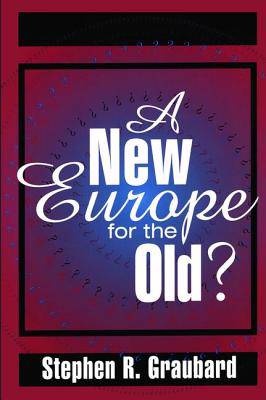
- Retrait en 2 heures
- Assortiment impressionnant
- Paiement sécurisé
- Toujours un magasin près de chez vous
- Retrait gratuit dans votre magasin Club
- 7.000.0000 titres dans notre catalogue
- Payer en toute sécurité
- Toujours un magasin près de chez vous
Description
Since 1989, it has been possible to review what has been published both at home and abroad on the communist states of Central and Eastern Europe and, no less importantly, on the Soviet Union itself, from a new perspective. Few have chosen to engage in this Herculean task, whether out of a residual civility in not wishing to mock certain aging scholars whose research would appear curiously dated, or out of a sense of fatigue with the whole subject of casting aspersions on mistaken views. "A New Europe for the Old?" asks whether the master narratives that circulated so widely in the West in the half-century since 1945 remain valid. Stephen Graubard's volume raises pertinent questions regarding the current state of the European world as it has evolved since 1989. He includes contributions from important scholars around the world: "A New Europe for the Old?" by Martin Malia; "The Serbs: The Sweet and Rotten Smell of History" by Tim Judah; "Illyrianism and the Croatian Quest for Statehood" by Marcus Tanner; "To Be or Not To Be Balkan: Romania's "Quest for Self-Definition" by Tom Gallagher; "Ukraine: From an Imperial Periphery to Sovereign State" by Roman Szporlunk; "Ethnic Nationalism in the Russian Federation" by Anatoly M. Khazanov; "Im Osten viel Neues: Plenty of News from the Eastern Lander" by Barbara Ischinger; "Discourse and (Dis)Integration in Europe: The Cases of France, Germany and Great Britain" by Vivien A. Schmidt; "The European Debate on Citizenship" by Dominique Schnapper; "Has the Nation Died? The Debate Over Italy's Identity (and Future)" by Darion Biocca; and "Postwar Europe" by Arne Roth. "A New Europe for the Old?" provides greater sympathy for the complexity of societies, and argues for greater balance of those that are small, and that do not cast a long shadow in the world today. In the 21st as in the 20th century, they may be engines of change, both as a result of the disorder that they produce as well as the ways in which their values, however seemingly antiquated, survive and prosper, and not only in their native lands. This volume should intrigue historians and European studies scholars alike.
Spécifications
Parties prenantes
- Auteur(s) :
- Editeur:
Contenu
- Nombre de pages :
- 276
- Langue:
- Anglais
Caractéristiques
- EAN:
- 9780765804655
- Date de parution :
- 01-10-98
- Format:
- Livre broché
- Format numérique:
- Trade paperback (VS)
- Dimensions :
- 152 mm x 229 mm
- Poids :
- 452 g

Seulement chez Librairie Club
+ 81 points sur votre carte client de Librairie Club
Les avis
Nous publions uniquement les avis qui respectent les conditions requises. Consultez nos conditions pour les avis.





